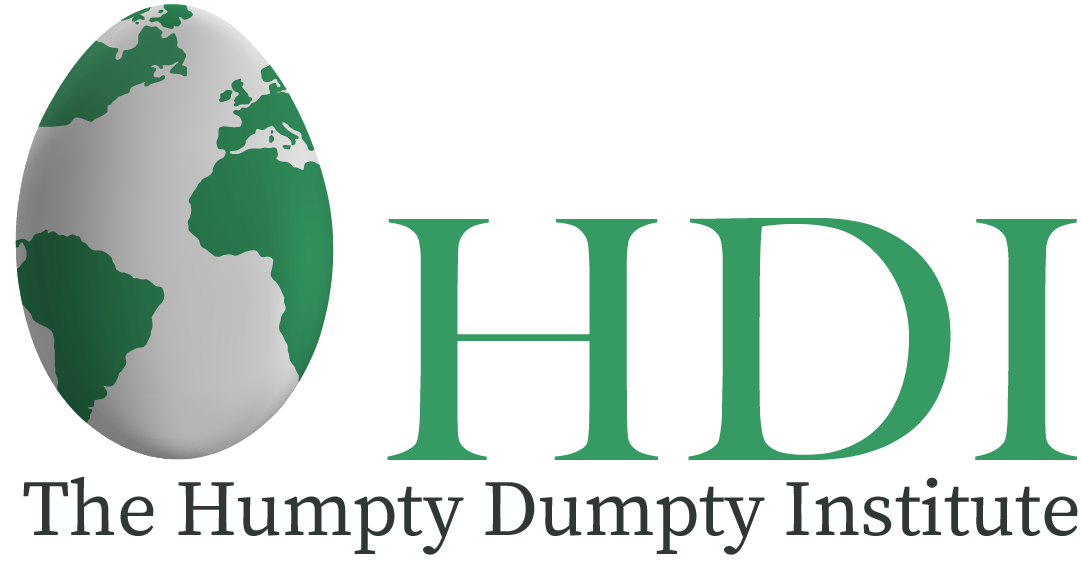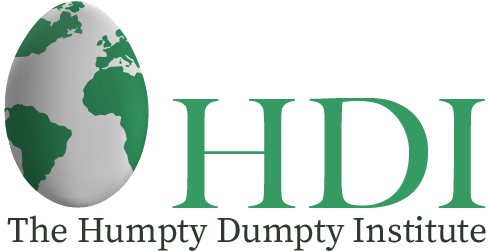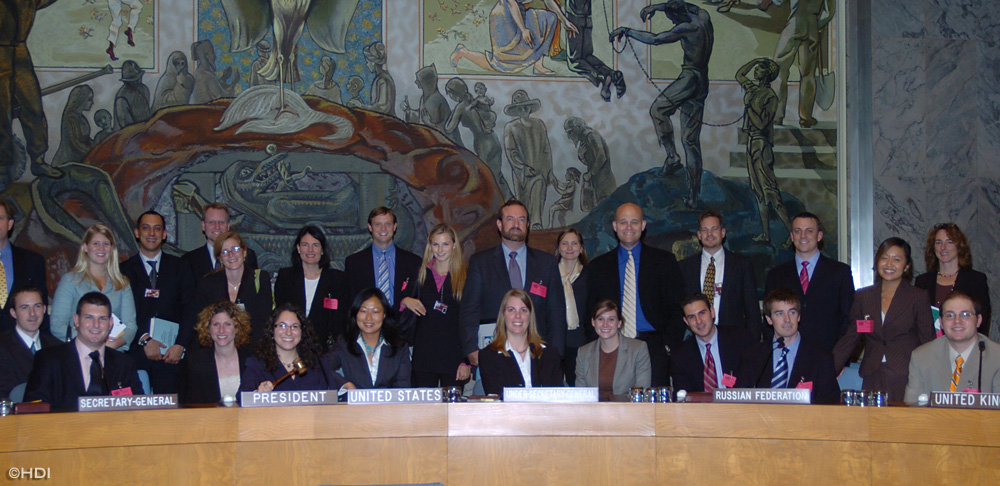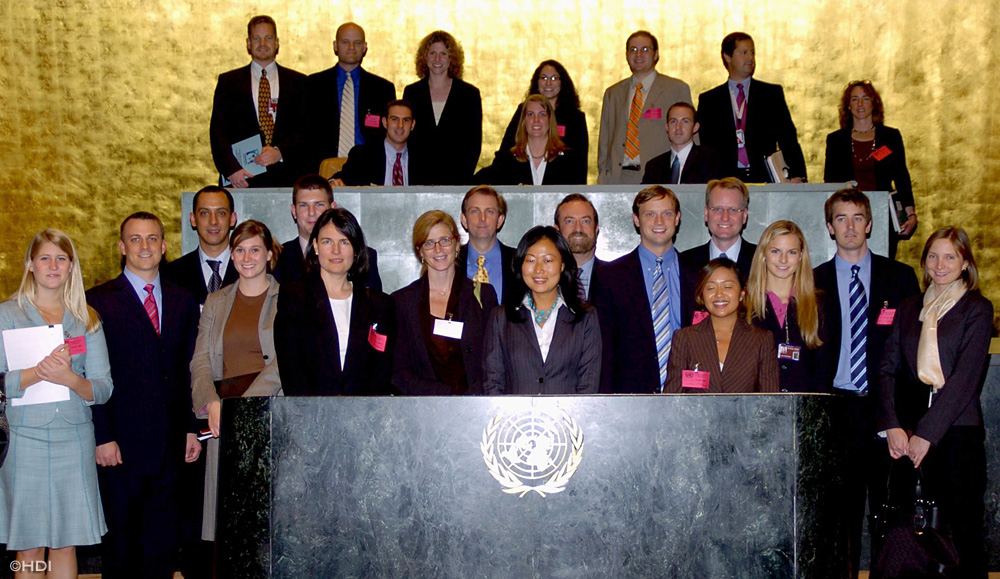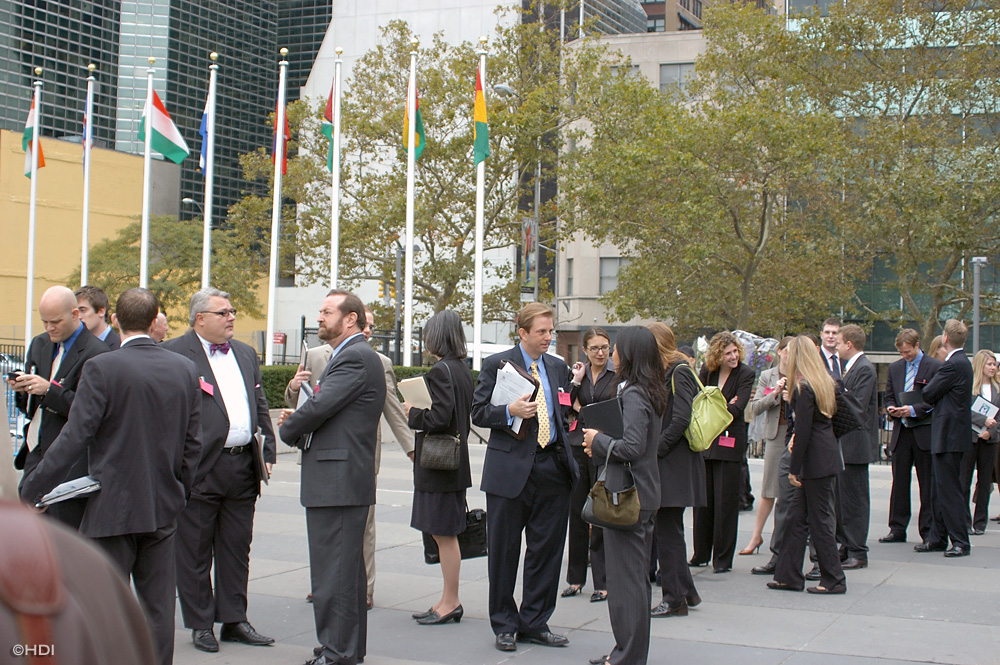Freshman Staffers
The Humpty Dumpty Institute sponsored its 16th Congressional Staff Visit to United Nations Headquarters on October 21, 2005. The bipartisan delegation comprised of twenty congressional staff from the U.S. House and Senate (most of whom represented Freshmen offices) and afforded each participant an unprecedented opportunity to meet with senior decision-makers at the U.S. Mission and at the United Nations to discuss issues critical to the U.S.-U.N. relationship behind closed doors.
The range of topics discussed included U.S. priorities at the United Nations, U.N. peacekeeping, U.N. reform and management initiatives, outcomes from the September 2005 World Summit, the Millennium Development Goals, and the role of the U.N. and affiliated agencies in providing emergency humanitarian relief. Three major themes dominated the day-long series of briefings:
- When discussing the United Nations, greater efforts should be made to distinguish between the actions of one Member-State, the Security Council, the General Assembly, and the U.N. Secretariat.
- Any attempt to withhold U.S. dues to the United Nations will dramatically affect the ability of the United States to play a leadership role at the United Nations on the discussion of U.N. reform.
- Security, development and management reform are themes whose individual successes are clearly linked to each other.
Executive Summary
Since 1998, the Humpty Dumpty Institute has been responsible for sponsoring bi-partisan visits to U.N. Headquarters by more than 280 Congressional offices on issues ranging from terrorism, U.S. arrears, landmines, humanitarian emergencies, peacekeeping, sustainable development, and post-conflict reconstruction. The Institute’s purpose for organizing these Congressional visits is simple: we believe that direct engagement leads to more informed and effective decision-making.
We are grateful for the continuing support we receive from the U.S. Mission to the United Nations, the United Nations Foundation, and the many officials at the United Nations whose participation have made these programs possible.
The Briefings
Tom Schweich, Chief of Staff at the U.S. Mission, began the program with a focused discussion of U.S. priorities at the United Nations 60th General Assembly, including the U.S. position toward U.N. reform initatives, Security Council expansion, human rights, and international efforts to combat terrorism. Mr. Schweich also addressed the question of whether and how the U.N. can strengthen itself as an institution and ensure that it effectively addresses the threats and challenges of the 21st Century. Other specific issues that Mr. Schweich addressed included overhauling the human rights structures at the UN, defining a set of criteria for the use of force, and reaching consensus on a definition of terrorism.
Jane Holl Lute, the Assistant-Secretary General for Peacekeeping Operations, briefed the delegation on the capacity of peacekeeping operations around the world. Ms. Lute emphasized that peacekeeping must function as a comprehensive intervention in order to maximize effectiveness, and relayed her own experience as a retired soldier in stating the mutually reinforcing effects of U.N. peacekeeping on American foreign policy. She pointed out that 120 nationalities are involved in 16 peacekeeping operations around the world.
Bob Orr, Senior Advisor to the Secretary-General and Assistant Secretary-General for Policy Planning, briefed the delegation on the outcomes of the 2005 World Summit, where heads of state agreed to take action on a range of global challenges: development, terrorism, peace-building, peacekeeping, peacemaking, human rights and the rule of law, management reform, humanitarian assistance and updating the U.N. Charter. Mr. Orr was especially optimistic about the Summit’s progress on terrorism, which provided a legal framework for the pursuit of terrorism. Finally, Mr. Orr reminded the participants that the Secretary-General has aggressively delivered more reform at the U.N. than any of his predecessors combined.
Guido Schmidt-Traub, Associate Director of the U.N. Millennium Project, discussed the Millennium Development Goals, a specific set of time-bound initiatives that would reverse the trend of extreme global poverty, hunger and disease that continues to affect over one billion people worldwide. Mr. Schmidt-Traub described in detail the eight Millennium Development Goals, summarizing some of the strategies for efficiently implementing each goal. He also addressed some of the persistent challenges that Sub-Saharan Africa continues to pose to the development efforts. Finally, Mr. Schmidt-Traub closed by describing a series of “quick wins”; relatively simple, yet effective, initiatives that can be implemented quickly and at little cost. Examples of these quick wins include purchasing anti-malarial bed nets to reduce the incidence of malaria and waiving school fees to dramatically increase school attendance.
At a working luncheon featuring presentations by Kevin Kennedy, Director for Coordination and Response Division for OCHA, and UNICEF Deputy Executive Director Rima Salah, participants engaged in a broad-ranging conversation on the role of the U.N. in humanitarian activities. Both Kennedy and Salah discussed their agencies role in providing humanitarian assistance to the Gulf Coast following Hurricane Katrina and to the areas affected by the recent earthquake is South East Asia.
The delegation also met with Under-Secretary-General for Management Chris Burnham to discuss his department’s actions within the context of far-reaching reforms of management controls, systems, and ethics. Burnhams’ briefing emphatically demonstrated the high degree of commitment on the part of the U.N. Secretariat toward U.N. reform and creating an organization capable of responding toward the challenges of the 21st century.
Schedule
Thursday, October 20
Check in to Murray Hill Suites Hotel
Location: 149 E 39th St. (between Lexington Ave. & 3rd Ave.)
6:30 pm
Cocktail Reception
Location: Thady Con’s Upstairs Lounge, 915 Second Avenue
(between 49th St. and 50th St.)
Friday, October 21
8:30 – 9:30 am
Breakfast Briefing: U.S. Priorities at the United Nations
Tom Schweich, Chief of Staff
Richard Grenell, Spokesman
Location: U.S. Mission to the United Nations
10 – 10:50 am
Overview of U.N. Peacekeeping Operations
Jane Holl Lute, Assistant-Secretary-General for Peacekeeping
Location: Conference Room E
11 – 11:50 am
Outcome of the 2005 World Summit
Robert Orr, Senior Advisor to the Secretary-General
Location: Conference Room E
12 – 12:50 pm
Achieving the Millennium Development Goals
Guido Schmidt-Traub, Associate Director of the Millennium Project
Location: Conference Room E
1 – 2:15 pm
Working Luncheon: U.N.’s Role in Hurricane Relief and Humanitarian Assistance
Kevin Kennedy, Director, Coordination and Response Division, OCHA
Rima Salah, Deputy Executive Director, UNICEF
Location: Delegates Dining Room
2:30 – 3:20 pm
Current Issues in U.N. Management and Reform
Chris Burnham, Under-Secretary-General for Management
Location: Department of Management Board Room
3:30 – 4:15 pm
UN Headquarters Site Inspection Tour
Participants:
United States Congress – Senate Staff
Dan Barron, Office of Senator James Inhofe (R-OK)
Julie Chon, Senate Democratic Policy Committee
Paul Foldi, Senate Foreign Relations Committee – Majority
Kimberly Gluck, Office of Senator James DeMint (R-SC)
Catherine Henson, Office of Senator Johnny Isakson (R-GA)
Melissa Koenigsberg, Office of Senator Ken Salazar (D-CO)
Samantha Power, Office of Senator Barack Obama (D-IL)
Jennifer Simon, Senate Foreign Relations Committee – Minority
Scott Thayer, Office of Senator John Sununu (R-NH)
United States Congress – House Staff
Aaron Brand, Office of Rep. Allyson Schwartz (D-PA)
Deana Funderburk, Office of Rep. Virginia Foxx (R-NC)
Trey Hicks, Office of Rep. Ted Poe (R-TX)
Louie Meizlish, Office of Rep. John Schwarz (R-MI)
Ryan Quinn, Office of Daniel Lipinski (D-IL)
Shelley Rood, Office of Rep. Debbie Wasserman Schultz (D-FL)
Steve Sidorek, Office of Rep. Dan Boren (D-OK)
Diana Tasnadi, Office of Rep. Jeff Fortenberry (R-NE)
Kimberly Trinh, Office of Rep. David Reichert (R-WA)
Will Van Dorn, Office of Rep. Gwen Moore (D-WI)
Ryan Young, Office of Rep. Kenny Marchant (R-TX)
United States Mission to the United Nations
Tom Schweich, Chief of Staff
Richard Grenell, Spokesman
Miriam Hughes, Deputy U.S. Representative to the Economic and Social Council
Peggy Kerry, NGO Liaison
Joseph Merante, Deputy Director of Communications
United Nations
Chris Burnham, Under-Secretary-General, Department of Management
John Clarkson, Programme Director, U.N. Capital Master Plan
Jane Holl Lute, Assistant Secretary-General, DPKO
Kevin Kennedy, Director, Coordination and Response Division, OCHA
Robert Orr, Assistant Secretary-General, Executive Office of the Secretary-General
Rima Salah, Deputy Executive Director, UNICEF
Guido Schmidt-Traub, Associate Director, U.N. Millennium Project
Observers
Will Davis, Director, U.N. Information Center – Washington Office
Deborah Derrick, Director, Better World Campaign
Travis Horel, Deputy Director, U.S. Mission to the United Nations – Washington Office
Susan Myers, Executive Director, United Nations Foundation – New York Office
The Humpty Dumpty Institute
Ralph L. Cwerman, President
William Rigler, Executive Director
Caroline Gosselin, Program Manager
Caitlin Fitzpatrick, Associate
Ivo Ivanovic, Associate
Nathan Robb, Associate
